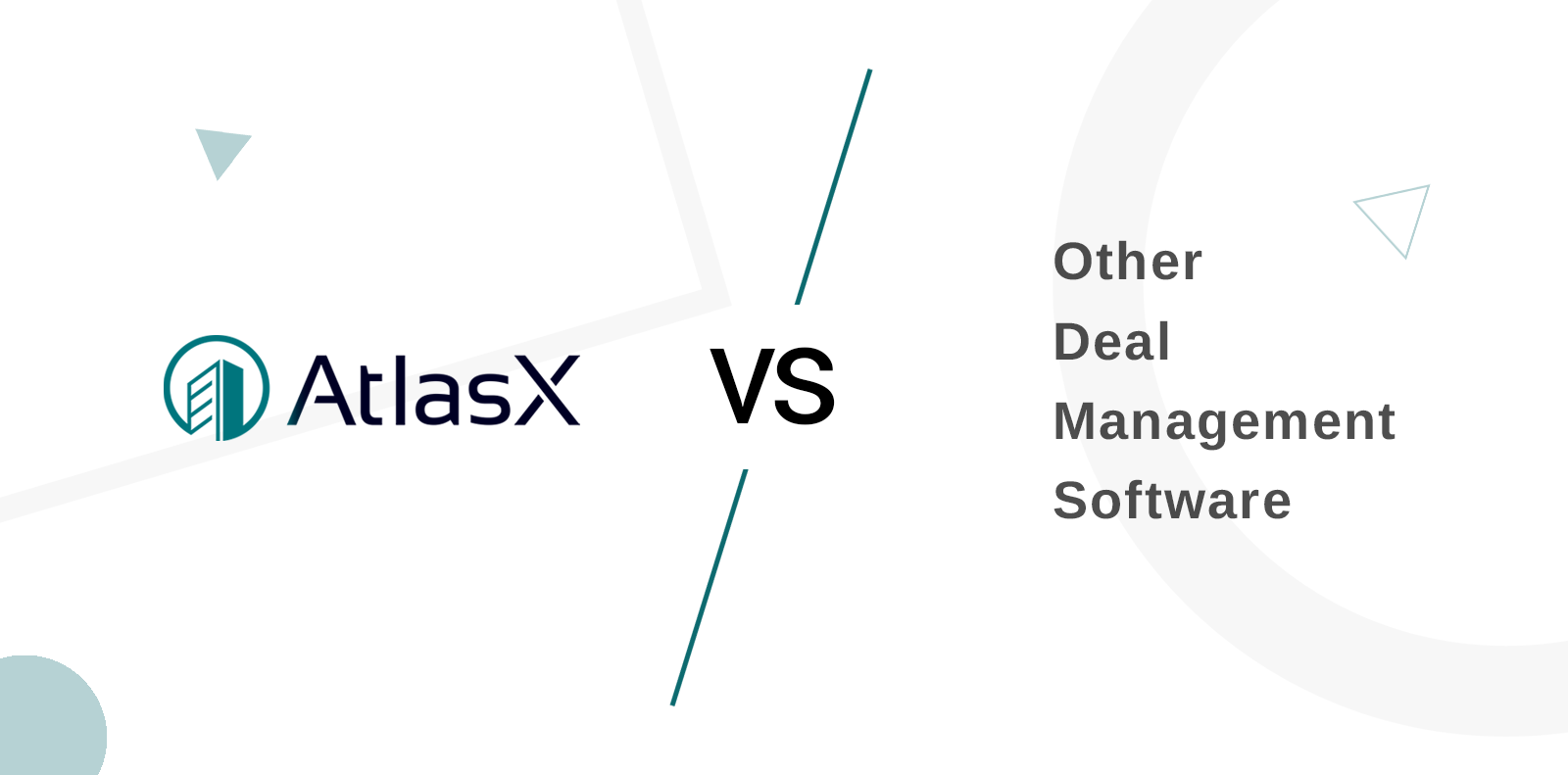CRE Software Comparison: AtlasX vs. Other Deal Management Platforms
John Ledger

In the fast-paced world of Commercial Real Estate (CRE), where deals are struck, negotiations unfold, and transactions take center stage, having a strategic ally in the form of deal management software is becoming increasingly indispensable. But what exactly is deal management software? It’s a specialized type of software meticulously crafted to streamline and optimize the intricate process of managing business deals, negotiations, and transactions.
This software isn’t just a digital toolkit; it’s a game-changer, especially in CRE, where the stakes are high, and precision is paramount. Tailored for use by dealmakers and portfolio managers, deal management software acts as the linchpin, fostering efficiency, collaboration, and transparency throughout the deal lifecycle.
In this blog, we delve into the world of deal management software, exploring its functionalities, benefits, and how it transforms the landscape of CRE, propelling professionals toward heightened success in the competitive realm of real estate negotiations.
Key Features
Every deal management software serves a key purpose: to help CRE professionals track, manage, and execute on deals. Although different software vary in their approaches to this purpose, every software has a few universal features. Later in this blog we will cover how major deal management products handle the challenges of addressing necessary features.
Key Feature #1: Pipeline Management
Deal management software acts as a dynamic visual aid, allowing users to gain insights into the lifecycle of their deals. By providing an intuitive pipeline view, teams can easily track and monitor the progress of each deal as it navigates through various stages of the negotiation and closing process. This feature empowers users to identify bottlenecks, prioritize tasks, and make informed decisions to accelerate deals towards successful closure.
Key Feature #2: Document Management
Effortlessly organize, store, and share crucial documents related to each deal with the document management feature. From contracts and proposals to legal documents, this functionality ensures that all relevant files are centralized and easily accessible. Teams can collaborate seamlessly, and stakeholders can access the latest and most critical documents, fostering a more streamlined and transparent deal process.
Key Feature #3: Communication Tracking
Never miss a beat in deal-related conversations with the communication tracking feature. By centralizing all communication history, including emails, messages, and notes, associated with each deal, teams can maintain a comprehensive overview. Team members can work together seamlessly, sharing updates, insights, and feedback. This not only enhances accountability but also provides valuable context, facilitating smoother transitions between team members and ensuring everyone is on the same page.
Key Feature #4: Task and Activity Tracking
The task and activity tracking feature allows users to stay organized and proactive. Create and assign tasks, set deadlines, and track activities related to each deal. This ensures that responsibilities are clear, deadlines are met, and the overall progress aligns with the overarching strategy, minimizing the risk of oversights or delays.
Key Feature #5: Analytics and Reporting
Gain valuable insights into deal performance with the analytics and reporting features. Identify trends, assess the effectiveness of strategies, and make data-driven decisions. These tools empower users to refine their approach, optimize processes, and ultimately enhance the success rate of their deals.
Key Feature #6: Integration
Seamlessly connect deal management software with other essential business tools, such as customer relationship management (CRM) systems, email platforms, and project management tools. Integration ensures a smooth flow of data between systems, eliminating silos and providing a holistic view of all relevant information.
Key Feature #7: Security
Protect sensitive deal information with robust security measures. Deal management software prioritizes security through user permissions, encryption, and access controls. This ensures that only authorized personnel have access to confidential information, maintaining the integrity and confidentiality of each deal. As a result, users can trust that their data is secure, fostering confidence in the deal management process.
CRE Software Company Comparison
AtlasX is a CRE deal management software based in New York City, founded in 2017 and brought to market in 2018. The founders of AtlasX saw an opportunity: with a burgeoning commercial real estate market and unsatisfying personal experiences with the big deal management software companies, they set out to create a platform more easy-to-use, efficient, and intelligent than any other platform on the market. But in the years since its release, how does AtlasX’s vision hold up?
AI and Intelligence
AtlasX is a pioneer in deal management AI, allowing users to spend less time manually mining numbers from complicated OMs and more time executing on deals using automatic population features. Although AI is no stranger to the CRE industry, AtlasX is ahead of the game: most major competitors have either just started to use AI in their platforms, or still outsource their data entry to off-shore data entry subcontractors, creating time management and potential security risks. Machine learning and integration have only exacerbated AtlasX’s data advantage, and the platform will only become more powerful as new AI innovations continue to push the platform forwards.
Reporting and File Uploads
As identified above, reporting is one of the most important parts of any deal management system: without the ability to create concise and applicable analyses, a company suffers inefficiencies both internally between decision makers and externally between stakeholders. Despite this necessity, the majority of the CRE deal management market have rigid reporting systems that impose limits on fields and output basic tabular reporting. AtlasX, conversely, has unlimited in-depth fields and easily manipulatable reports with editable visuals that allow users to create better and more efficient presentations.
Relationship Management
Relationships create deals. That’s why they’re one of the most important parts of a deal management software system. AtlasX has a built-in CRM system that automatically syncs emails, integrates Outlook and Gmail, and sends follow-up reminders to make relationship building more convenient and cohesive. Through customizable software options, users can create their CRM system the way that is most helpful to them – eliminating the need for generic and clunky traditional CRM softwares. AtlasX is unique in this feature: most other deal management softwares have no relationship management systems in place.
Workspaces
Successful workspace organization can become a company’s biggest competitive advantage if set up effectively. AtlasX recognizes that traditional hierarchies are not always effective in CRE markets: the AtlasX software is not just one master account, but a customizable set of account divisions through departments, geographic regions, or business units. Separating east coast vs. west coast, or development vs. acquisitions, can eliminate needless cross-department confusion and repetition. Other deal management platforms lack the ability to create bifurcated workspaces, creating inefficiencies and needless work.
Support System
IT experts and techies traditionally manage deal management support systems. While this sounds like a fine fix to most software problems, in practice, these support systems fall short because IT experts do not understand the intentions behind deal management software. AtlasX’s support are all real estate experts themselves, besides being intimately familiar with the back-workings of deal management software. This allows the AtlasX support system to solve the root of tech problems, instead of providing band-aid work-arounds.
Engineering Specificity
The CRE market is ever-changing: gone are the days where the only investors in commercial real estate were limited to billion-dollar investment funds. Unfortunately, the average deal management software has not adapted to these shifts – most softwares are designed for large institutional investors and include an unnecessary amount of field-heavy overkill. This means that smaller investors are often using inefficient systems designed for a whole different company hierarchy. AtlasX uses a simpler and more efficient system to adapt to this new market of investors: despite being able to handle and track robust projects easily, the AtlasX system promotes ease-of-use and simplicity instead of needless project management capacity.
Implementation and Pricing
For quickly growing companies, deal management software is a game changer. But implementing this software on a company-wide basis can take months, as the software company smooths out kinks and adapts the software to client needs. AtlasX has recognized the need for quick transitions, and implements its software in weeks, rather than months. With a team of dedicated real-estate techsperts, AtlasX is more adaptable and agile, in half the time. Despite this, AtlasX is priced competitively due to its streamlined operations and agile workstreams.


